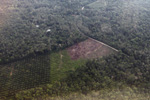KCF, Pizza Hut, Taco Bell policy excludes fiber from conversion of old-growth rainforests to plantations.
After a prolonged campaign by environmental activists, the world’s largest fast food company has announced a new sourcing policy that will shift it toward greener packaging materials.
Yum! Brands, the restaurant giant that owns Taco Bell, KFC, and Pizza Hut, says it will exclude paper and cardboard that has been sourced via the destruction of tropical rainforests. Yum also says it will increase the proportion of recycled content in its packaging; eliminate fiber from forests that have been converted to plantations and forests where wood has been harvested in violation of human rights; and timber from unknown origins.
“Given the large volume of packaging we buy, Yum! is uniquely positioned to provide environmentally preferable packaging to our consumers around the globe while also reducing our impact on the environment and our communities,” Yum said in a statement on its web site. “Yum! is committed to making sustainable packaging a priority.”
Yum says it will give preference to suppliers who source wood fiber which meets “the most rigorous forest management standards” including the Forest Stewardship Council (FSC) and the Program for Endorsement of Forest Certification (PEFC) provided it meets overarching criteria on plantations, rights, and high conservation value. The standards suggest that Yum will exclude fiber produced via the conversion of primary forests for plantations, a long-running demand by environmental groups, including Greenpeace and the Dogwood Alliance, as well as young activist Cole Rasenberger.

Conversion of rainforests for acacia plantations in Borneo in 2012. Photo by Rhett A. Butler
Yum will release “a more detailed procurement policy with public targets to achieve these goals” by 2014.
Conversion of forests for paper and packaging production is one of the biggest drivers of deforestation in some regions. Researchers estimate that up to a quarter of forest clearing in Sumatra since in mid-1980’s was the result of pulp and paper production.
YUM! BRANDS – FOREST POLICY STATEMENT Given the large volume of packaging we buy, Yum! is uniquely positioned to provide environmentally preferable packaging to our consumers around the globe while also reducing our impact on the environment and our communities. Our ability to serve food safely, quickly and conveniently is largely dependent upon our use of disposable packaging. Throughout the quick service restaurant industry, the way in which we package food has been consistent with the standardized packaging available in the industry. Understanding and addressing our packaging impact on the environment and working closely with our suppliers, is a global imperative for the long-term sustainability of our business. Yum! is committed to making sustainable packaging a priority. In support of this commitment, we have developed the following Sustainable Sourcing and Waste Recovery Principles:
Over the next several months, Yum! will engage with our suppliers and gathering data on all paper-based packaging sourcing to assess our current state. This will allow us to better understand the forest sources of our fiber, identify higher risk sources, avoid or phase out of unwanted sources, and preference more responsible sources. By 2014, we will release a more detailed procurement policy with public targets to achieve these goals. We are collaborating with a third-party to assist us in this effort. |
Related articles
After protracted Greenpeace campaign, KFC UK says it will no longer source from Asia Pulp & Paper

(10/31/2012) After months of pressure from Greenpeace on its alleged links to deforestation in Indonesia, KFC UK/Ireland has adopted a forest policy that excludes fiber sourced via conversion of tropical rainforests. The policy excludes suppliers like Asia Pulp & Paper (APP), the Chinese/Indonesian forestry giant that has been the primary target of the Greenpeace campaign, but appears to apply only to Kentucky Fried Chicken operations in Britain and Ireland.
Disney drops paper suppliers linked to deforestation
(10/12/2012) Disney this week announced sweeping changes to its paper-sourcing policy that will exclude fiber produced via the destruction of tropical rainforests.
Ten-year-old takes on KFC for destroying US forests

(05/15/2011) Cole Rasenberger’s quest to save forests in the US South started as a school assignment to ‘be an activist’ about something important to him. However, after learning from Dogwood Alliance that coastal forests in North Carolina are being destroyed to make throw-away paper packaging for big fast food companies—such as McDonalds and KFC—Cole Rasenberger, at the age of 8, became more than an activist; he became an environmental leader! He started by targeting McDonalds directly. With the help of 25 friends, and his elementary school administration, he got every student in his school to sign postcards to McDonalds. In all, Cole sent 2,250 postcards to McDonalds.
Pulp and paper firms urged to save 1.2M ha of forest slated for clearing in Indonesia

(03/17/2011) Indonesian environmental groups launched a urgent plea urging the country’s two largest pulp and paper companies not to clear 800,000 hectares of forest and peatland in their concessions in Sumatra. Eyes on the Forest, a coalition of Indonesian NGOs, released maps showing that Asia Pulp and Paper (APP) and Asia Pacific Resources International Limited (APRIL) control blocks of land representing 31 percent of the remaining forest in the province of Riau, one of Sumatra’s most forested provinces. Much of the forest lies on deep peat, which releases large of amount of carbon when drained and cleared for timber plantations.
FSC mulls controversial motion to certify plantations responsible for recent deforestation

(06/24/2011) Members of the Forest Stewardship Council (FSC), meeting in Malaysia this week for its General Assembly, will consider various changes to the organization, including a vote on a controversial motion that would open the door—slightly at first—to sustainable-certification of companies that have been involved in recent forest destruction for pulp and paper plantations. Known as Motion 18, the change is especially focusing on forestry in places where recent deforestation has been rampant, such as Indonesia and Malaysia.
Timber certification is not enough to save rainforests

(06/02/2010) In the 1980s and 1990s pressure from activist groups led some of the world’s largest forestry products companies and retailers to join forces with environmentalists to form the Forest Stewardship Council (FSC), a certification standard that aims to reduce the environmental impact of wood and paper production on natural forests. Despite initial skepticism on whether buyers would pay a premium for greener forest products, FSC quickly grew and by 2000 had become a standard in many markets, including Europe and the United States. Companies like Home Depot, Lowe’s, and Ikea are today strong supporters of the FSC. But the FSC has not been without controversy. In recent years some activists have voiced concern about FSC standards as well as the credibility of auditors that certify timber operations. Among the initiative’s supporters is the Rainforest Action Network (RAN), a group best known for its aggressive protest tactics. RAN says engagement with the FSC is better than the alternative: leaving the timber industry to devise its own sustainability standards.
Forest certification system needs reform to ensure sustainability – report
(11/04/2008) Demand for wood products is ultimately one of the largest drivers of global deforestation through both direct clear-cutting and selective logging, which increases a forest’s vulnerability to fire and subsequent clearing and disturbance by other actors, including hunters, subsistence farmers, land speculators, ranchers and agro-industrial firms. Reducing the detrimental environmental impacts of meeting wood demand is critical to protecting the world’s forests as healthy, productive and resilient ecosystems.